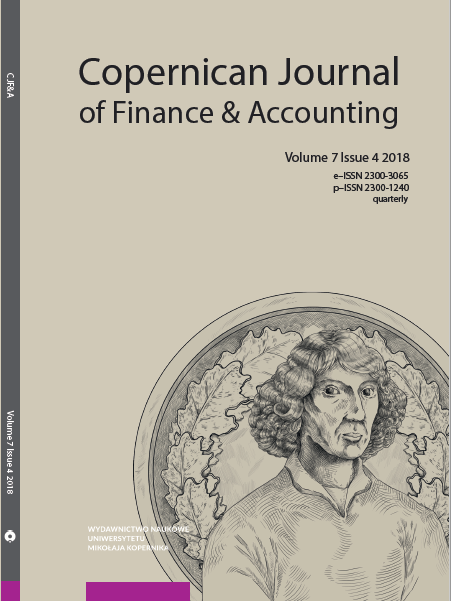THE UNIQUE OPPORTUNITIES OF ACCOUNTING TO PROMOTE TRANSPARENCY OF ECONOMIC PROCESSES
DOI:
https://doi.org/10.12775/CJFA.2018.024Keywords
rules of the game, institutions, accounting, information, transparent economic processesAbstract
The article is devoted an important role the Institute of Accounting in the modern economy. This role is supported by unique institutional and informational opportunities determined by its specific characteristics. On the one hand, accounting is the legislative and normative institution through which the controlling and regulating institutions influence the economic processes occurring at each enterprise. On the other hand, the accounting system creates an information database on the actual economic activity of each enterprise required by users. Such a database is formed due to the fact that accounting is an exclusive registrar of business activities: documentation, inventory, assessment, calculation, accounts, double-entry bookkeeping, balance, reporting. These methods have such a mathematical feature that has made it possible to fully them with the latest information technologies. All of these factors allow accounting to provide transparent accounting information to any users and institutions.References
Banociova, A., & Pavlikova, L. (2014). Accounting Plan – Information Base for Management. Journal Procedia Economics and Finance, 15, 312–317. http://dx.doi.org/10.1016/S2212-5671(14)00513-9.
Brandas, C., Megan, O., & Didraga, O. (2015). Global Perspectives on Accounting Information Systems: Mobile and Cloud Approach. Journal Procedia Economics and Finance, 20, 88–93. http://dx.doi.org/10.1016/S2212-5671(15)00051-9.
Burns, J., & Scapens, R.W. (2000). Conceptualizing management accounting change: an institutional framework. Journal Management Accounting Research, 11(1), 3–25. http://dx.doi.org/10.1006/mare.1999.0119.
Campbell, D., & Klaes, M. (2005). The principle of institutional direction: Coase’s regulatory critique of intervention. Cambridge Journal of Economics, 29(2), 263–288.http://dx.doi.org/10.1093/cje/bei027.
Chapman, C.S., & Kihn, L.A. (2009). Information System Integration – Enabling Control and Performance. Journal Accounting, Organizations and Society, 34(2), 151–169. http://dx.doi.org/10.1016/j.aos.2008.07.003.
Dacin, M.T., Goodstein, J., & Scott, W.R. (2002). Institutional theory and institutional change: Introduction to the special research forum. Journal Academy of Management, 45(1), 45–57.
Eccles, R.J., Herz, R.H., Keegan, E.M., & Phillips D.M. (2002). The revolution in corporate reporting: How to talk with the capital market on the language value, rather than profit. Moscow: Olimp-Business.
Golov, S.F. (2007). Accounting in Ukraine: An Analysis of the Status and Prospects of Development. Kyiv: Center of educational literature.
Haidai, T.V. (2006). The Institution as an Instrument for Institutional Economic Analysis. Journal Economic Theory, 2, 53–54.
Higgins, J.H., & Smith B.L. (2015). 10 Steps to a Digital Practice in the Cloud: New Levels of CPA Firm Workflow Efficiency, 2nd Edition. Durham: American Institute of Certified Public Accountants, Inc. http://dx.doi.org/10.1002/9781119449317.
Marius, C.D., Denisa, C.M., & Florina, B. (R.) I. (2012). Managerial Accounting – a Source of Information for an Efficient Management in SME. Journal Procedia – Social and Behavioral Sciences, 62(24), 521–525. http://dx.doi.org/10.1016/j.sbspro.2012.09.085.
Navarro-García, J.C., & Madrid-Guijarro, A. (2016). Real economic activity and accounting information in Spanish construction and real estate firms. Journal Revista de Contabilidad, 19(1), 21–30. http://dx.doi.org/10.1016/j.rcsar.2014.10.002.
Papazov, E., & Mihaylova, L. (2015). Organization of Management Accounting Information in the Context of Corporate Strategy. Journal Procedia – Social and Behavioral Sciences, 213, 309–313. https//dx.doi.org/10.1016/j.sbspro.2015.11.543.
Robalo, R. (2014). Explanations for the gap between management accounting rules and routines: an institutional approach. Journal Revista de Contabilidad, 17(1), 88–97. http://dx.doi.org/10.1016/j.rcsar.2014.03.002.
The Verkhovna Rada of Ukraine (2010). The tax code of Ukraine. No. № 2755-VI. Available at: http://taxlink.ua/ua/.
Trigo, A., Belfo, F., & Estébanez, R.P. (2016). Accounting Information Systems: Evolving towards a Business Process Oriented Accounting. Procedia Computer Science, 100, 987–994. http://dx.doi.org/10.1016/j.procs.2016.09.264.
Downloads
Published
How to Cite
Issue
Section
Stats
Number of views and downloads: 741
Number of citations: 0



